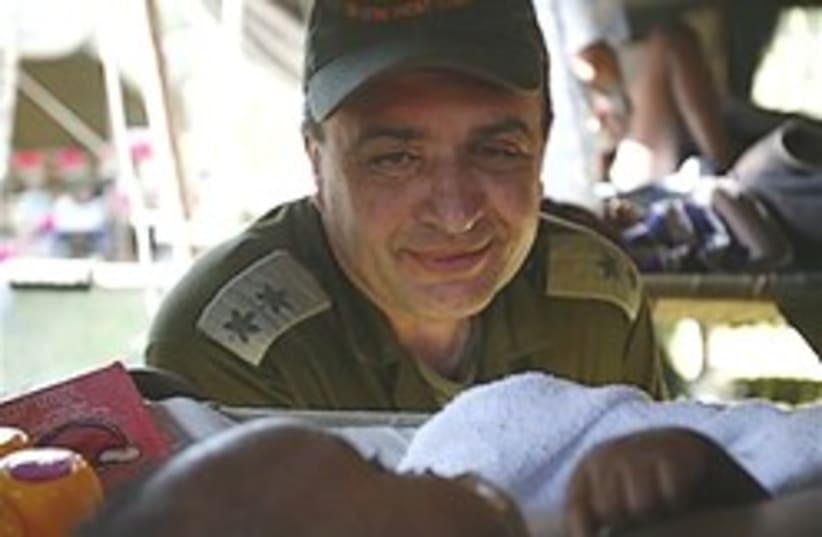In recent days, the international press coveringthe relief operations in Haiti has been awash in astonishing reportscommending Israel's tremendous work in medical disaster response andsetting up a field hospital operation that has other nations looking onin awe. Even as these reports have left us feeling intense pride in oursoldiers sent on this remarkable mission, our reaction back home hasbeen one of far less surprise.
FromCBS to CNN to MSNBC and numerous other outlets across the medialandscape, wide-eyed medical reporters have been witnessing the Israelioperation with an underlying tone of combined admiration and jealousy.
Why is it that of the dozens of countries contributing to therelief effort, with delegations of all shapes and sizes, it's theIsraelis who travel halfway around the world and within hours have afully operational hospital in place? Journalists point with amazementat our mobile imaging machinery and sedated patients on ventilators andask outright why anyone else can't be doing this.
THE REASON we're not surprised is because we know that we'vebeen training for years for just these types of scenarios. We can alsoappreciate that Israel sees part of its mandate as a military andmedical leader to make sure that expertise and know-how will benefitthe international community should the opportunity present itself.
And so, as much as our enemies desire to paint theIDF solely as a hawkish, war-seeking powerhouse, this mission showsjust the opposite to be true.
Admittedly, our adeptness in launching these types ofoperations stems from a history of confronting hostilities and beingprepared to address every possible threat. I personally recall from mydays as commander of a field hospital in the First Lebanon War that weset up such a field medical facility within hours and that "real-life"training was just one of many invaluable tests that would benefit theIDF Medical Corps in the future.
Overthe years, the brave men and women of our army have recalled thoselessons on all too many occasions, both here and just as often in portsof call in other parts of the world.
So when the news came across the wires last week that Haiti had been rocked by a devastating earthquake, the question was never if Israel would be there to respond, but only how soon.
Those of us involved in emergency management anddisaster response know all too well that Israel has a unique advantageover most, if not all, nations in this discipline. Rarely does a weekgo by where somewhere in the country a major drill is not held in oneof our hospitals in this specific area. Our protocols and emergencydepartments have become models for hospitals all around the world.
Despite our relatively small size and urban landscapes thatpale in comparison to most of the West, our Home Front Command has madeit a principal training objective to remain ever-ready for all types ofdisasters.
EVEN WITH the very limited traditional communication tools thatexist between Israel and our rescue teams in Haiti, I have had thechance to be in touch with my colleagues from Shaare Zedek on a coupleof occasions since they landed in the earthquake zone. The underlyingtone that comes across is one of overwhelming shock at the scope of thedisaster they face, yet they admit that they felt as prepared ashumanly possible for the medical realities they were confronting.
What has been most challenging without a doubt has been theemotional experiences. Many of those in the field hospital are seasonedveterans of the military and have treated hundreds if not thousands ofvictims of warfare and terrorism.
However, they report that perhaps more than ever before, inHaiti desperate questions of medical ethics are being asked even beforethe ones over the best course of treatment. Each patient must be judgedbased on the chances for his or her survival. The medical process willthen only commence if the doctors and nurses believe that this case hasbetter stakes for a positive outcome that the victim that liesimmediately next in line.
These are devastating questions for even the most hardenedmedical professional and ones that are challenging Israel's medicalteams countless times each day.
Beyond these stories of disaster and loss, the Israeliexperience in Haiti still promises to be one of hope and promise. Theworld has quickly learned that the "successes" we are achieving therehave come because we appreciated the continuous need for this type oftraining. Even more so, it is recognizing that we have a role incontributing to the greater welfare of the international community.
Perhaps it's unfortunate that it's taken the devastatingtragedy in Haiti for the world to understand this invaluable lessonthat Israel has an enormous amount of good to contribute, both in goodtimes and bad. Yet, we can also be hopeful and confident that it's oneit won't soon forget.
The writer is director-general of Shaare Zedek MedicalCenter in Jerusalem. At present three Shaare Zedek physicians and itshead nurse are involved with medical relief efforts in Haiti.
